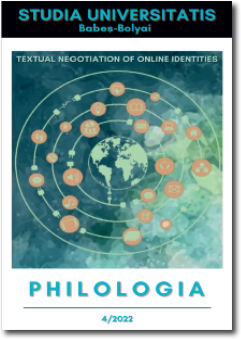ATTITUDES TOWARDS ROMGLISH IN ONLINE DISCOURSE
DOI:
https://doi.org/10.24193/subbphilo.2022.4.10Keywords:
language ideologies, heteroglossic ideologies, monoglossic ideologies, attitudes, Romglish, online discourseAbstract
Attitudes towards Romglish in Online Discourse. As English has become a global language, it has also become the language of computer-mediated communication. The online medium has offered the ideal space for English to enter in contact with multiple other languages and, as a result, to contribute to the formation of new varieties. In Romania, this new variety is Romgleză or Romglish, a combination of Romanian and English that is used especially by, but not limited to the younger generations. However, language change does not come easy and, although it has been around for quite a while, Romglish is still considered as improper by some. The present paper analyses two sets of online comments in order to identify attitudes towards Romglish and the language ideologies behind them. To this end, monoglossic ideologies, such as the standard language ideology (Milroy 2001) and the purist ideology (Langer & Davies 2005) will be taken as references when analysing the online comments. The data focuses mainly on two online sources: the Știrile Kanal D Facebook page and an Elforum thread, and it shows that rather than singular and static, language ideologies are multiple and rather fluid, with many online users displaying both monoglossic and heteroglossic ideologies.
Article history: Received 21 August 2022; Revised 23 October 2022; Accepted 31 October 2022; Available online 20 December 2022; Available print 30 December 2022.
REZUMAT. Atitudini relativ la romgleza din discursul online. Engleza este atât o limbă globală cât și limba comunicării mediate de calculator. Mediul online a oferit un spațiu ideal pentru ca engleza să intre în contact cu numeroase alte limbi și, astfel, să contribuie la formarea unor noi varietăți. În România, această nouă varietate este romgleza sau Romglish, o combinație între română și engleză care este folosită mai ales de către tânăra generație, dar nu numai. Schimbarea însă nu este ușoară și, deși există de ceva vreme, romgleza este considerată încă nepotrivită de către unele persoane. Prezenta lucrare analizează două seturi de comentarii online pentru a identifica atitudini față de romgleză și ideologiile lingvistice care le influențează. În acest scop, ideologii monoglose, precum ideologia limbii standard (Milroy 2001) și ideologia puristă (Langer & Davies 2005) vor fi luate în considerare. Datele culese sunt din două surse online: pagina de Facebook pentru Știrile Kanal D și discuția de la o postare de pe Elforum. Acestea arată că ideologiile lingvistice nu sunt singulare și statice, ci multiple și mai degrabă fluide, utilizatorii online prezentând atât ideologii monoglose cât și heteroglose.
Cuvinte-cheie: ideologii lingvistice, ideologii heteroglose, ideologii monoglose, atitudini, romgleză, discurs online
References
Blackledge, Adrian. 2005. Discourse and Power in a Multilingual World Amsterdam: John Benjamins.
Crystal, David. 1997. English as a Global Language. Cambridge: Cambridge University Press.
Crystal, David. 2008. The Language Revolution. Cambridge: Polity Press.
Dragomirescu, Adina, and Alexandru Nicolae. 2011. 101 greșeli de lexic și de semantic. Cuvinte și sensuri în mișcare. București : Humanitas.
European Charter for Regional or Minority Languages. 1998. Accessed August 2022. https://www.coe.int/en/web/conventions/full-list/-/conventions/treaty/148.
Framework Convention for the Protection of National Minorities. 1998. Accessed August 2022. https://www.coe.int/en/web/conventions/full-list/-/conventions/treaty/157.
Iversen, Jonas Yassin, and Sitwe Benson Mkandawire. 2020. “Comparing Language Ideologies in Multilingual Classrooms across Norway and Zambia.” Multilingual Matters, 7 (3): 33–48.
Langer, Nils and Winifred Davies. 2005. “An Introduction to Linguistic Purism.” In Linguistic Purism in the Germanic Languages, edited by Nils Langer and Winifred, 1-17. Berlin & New York: Walter de Gruyter.
Milroy, James. 2001. “Language Ideologies and the Consequences of Standardization.” Journal of Sociolinguistics 5 (4): 530–555.
Oltean-Cîmpean, Alina. 2019. “Language Ideologies: The Case of Young Adults in Romania.” In Constructions of Identity 9, edited by Adrian Radu and Octavian More, 181-192. Cluj-Napoca: Presa Universitară Clujeană.
Oltean-Cîmpean, Alina. 2021. “Language Ideologies with Young Adults in Romania.” In Representations of Otherness in Romanian Philological Studies, edited by Silvia Florea, Eric Gilder, Diana Florea and Roxana Grunwald, 145-159. Berlin: Peter Lang.
Paraschivescu, Radu. 2018. Pastila de limbă – Exprimări ridicole în „romgleză”. Accessed October 2022. https://www.digi24.ro/stiri/actualitate/educatie/pastila-de-limba-exprimari-ridicole-in-romgleza-1018685.
Pașcu, Răzvan. 2011. Gandim si vorbim romgleza: „Am decat o idee about that”.Accessed August 2022. https://razvanpascu.ro/2011/05/27/gandim-si-vorbim-romgleza-am-decat-o-ideea-about-that/.
Pruteanu, George. 2007. Română sau Romgleză?. Accessed October 2022. https://georgepruteanu.ro/6atitudini/2007.09.27-limba.htm.
Skutnabb-Kangas, Tove. 1988. “Multilingualism and the Education of Minority Children.” In Minority Education: From Shame to Struggle, edited by Tove Skutnabb-Kangas and Jim Cummins, 9-44. Clevedon: Multilingual Matters ltd.
Vișan, Ruxandra. 2016. "Linguists, Romglish and “Verbal Hygiene”." Romanian Journal of English Studies 13 (1): 137-144.
Weber, Jean-Jacques and Kristine Horner. 2012. Introducing Multilingualism. A Social Approach. New York/London: Routledge.
Data sources :
Limba română, asaltată de engleză. 2022. Accessed August 2022. https://www.facebook.com/watch/?ref=saved&v=238286285120190.
Romgleza noua limbă de aur românească. 2021. Accessed August 2022. https://www.elforum.info/topic/148507-romgleza-noua-limb%C4%83-de-aur-rom%C3%A2neasc%C4%83/.
Downloads
Published
How to Cite
Issue
Section
License
Copyright (c) 2022 Studia Universitatis Babeș-Bolyai Philologia

This work is licensed under a Creative Commons Attribution-NonCommercial-NoDerivatives 4.0 International License.





 ©Studia Universitatis Babeş-Bolyai Philologia. Published by Babeș-Bolyai University.
©Studia Universitatis Babeş-Bolyai Philologia. Published by Babeș-Bolyai University.